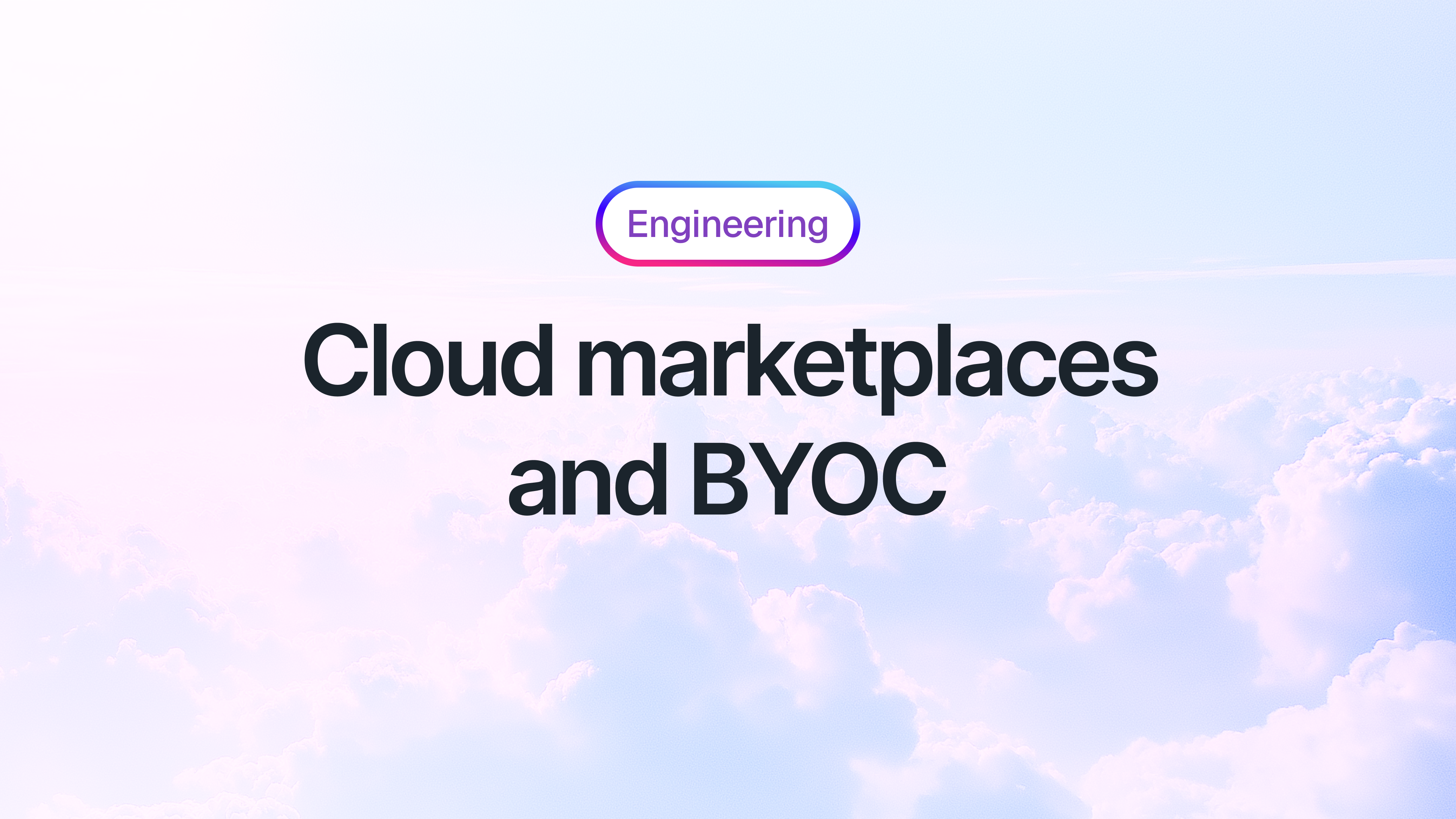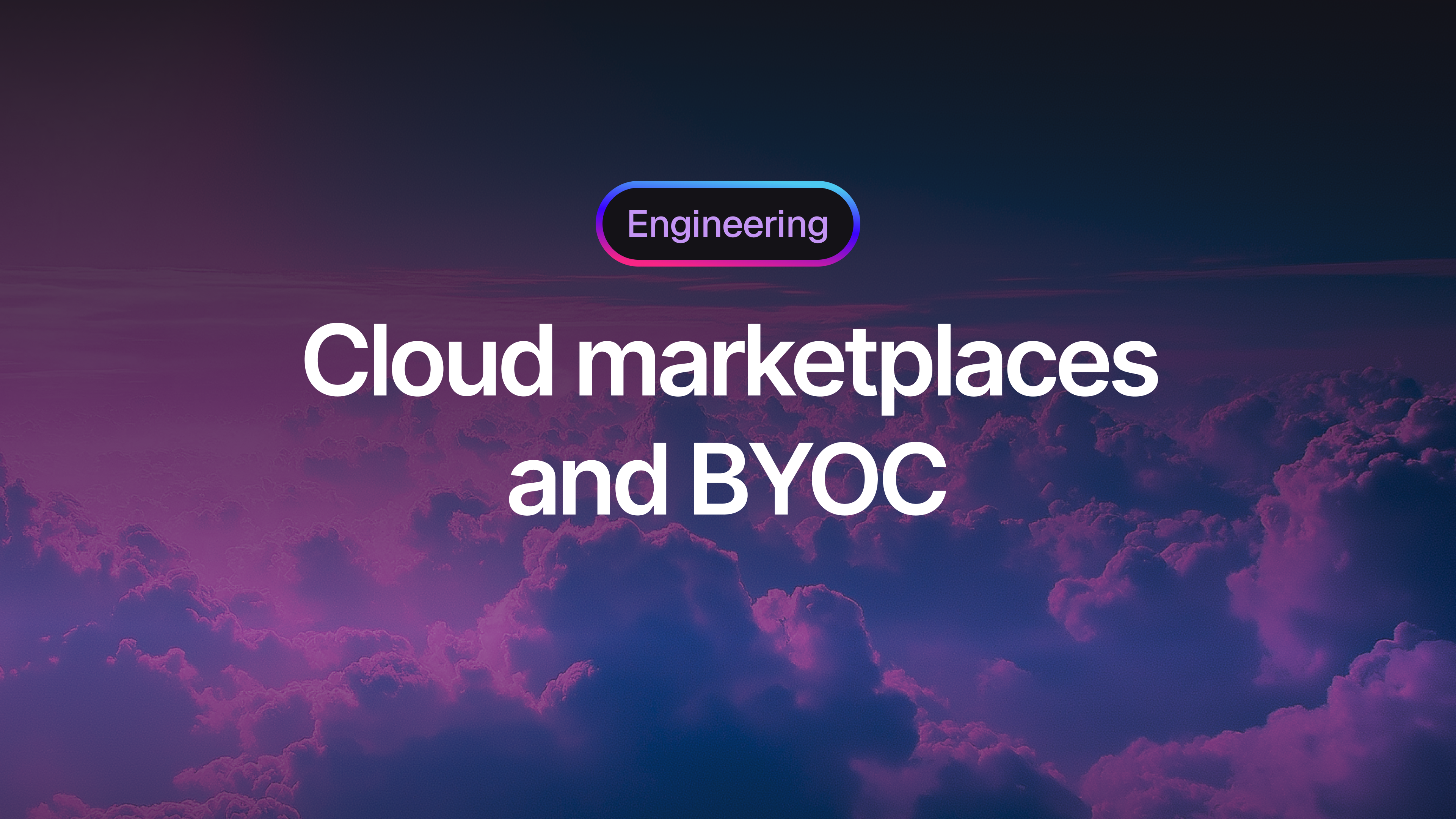Cloud marketplaces and BYOC
Create a consolidated deployment and billing experience with SaaS Listings, Private Offers and BYOC.

Jon Morehouse
Founder & CEO


We have recently spent more time with customers exploring public cloud marketplaces for better deal velocity, visibility, and additional deployment options.
Cloud marketplaces have not only evolved and added new offerings, but the dynamics of listing in them are starting to feel a lot more like App Stores than ever before.
Cloud Marketplaces
Cloud marketplaces are starting to show dynamics of mobile app stores.
In consumer social media, one of the most critical marketing tools is your position in the app store and rank in the categories related to your app. App store ranking, search, and optimization have created entire industries, and your performance on the app store can make or break your product’s success. Today’s cloud marketplace tools look much more like mobile app stores than they used to.
While marketplaces started as a way to grow long-tail usage and distribution, they have evolved to be a critical function for any modern SaaS company and can now power your entire customer base. Savvy companies are using this as a competitive edge by driving as many customers as possible to their listings.
If you are anything like us, you might think that marketplaces are mainly just a way to distribute self-hosted applications or OS distributions. Today’s marketplaces look a lot different because of two new concepts:
SaaS Listings - you can now list a SaaS application via your marketplace and let customers pay using credits for managed software.
Custom Offers - you can create custom or one-off deals for customers in the marketplace.
With these SaaS listings and custom offers, you can now service your entire customer base using marketplace listings and immediately start leveraging the network effects of the marketplaces themselves. Just like in the mobile world, how you rank and search goes a long way toward your growth, and where you rank in the marketplace will dictate your growth.
Cloud Marketplace SaaS Listings
Marketplace listings are no longer just for self-hosted apps and virtual machine images.
SaaS listings allow you to list your APIs and applications in the marketplace and give you the tools to contract and charge customers for usage. The SaaS listings enable you to create an entirely new delivery model for your existing product - all while having your customers pay via existing cloud credits.
With a SaaS listing, customers can find your application via the marketplace and sign up using your account, with billing tied to their AWS, GCP, or Azure account. Your application needs to send billing and usage data to the cloud APIs for this, but once you have this connected, you get the benefit of consolidated billing for your customer, allowing you to improve deal velocity.
Cloud Marketplace Private Offers
If you read this, you might think, “OK, but what if we do not have one-size-fits-all terms, contracts, and pricing? “Well, the marketplaces have thought of this, too, with private offers.
Private offers allow you to create custom terms, contracts, and pricing plans for specific customers, just like you would in any common sales cycle. This allows you to create different tiers and set up custom pricing for your largest customers.
The cloud marketplaces want to be the consolidated revenue operations platform for every business, and most software buyers can not turn down the value of consolidated billing.
Powering as much of your revenue and contracting operations via the marketplace is an example of aligning incentives—your customers get a consolidated billing experience and can use their existing contracts, you get increased visibility, and the marketplaces increase usage.
BYOC + Cloud Marketplaces
Offer BYOC to service enterprise customers via your marketplace listing.
TLDR: You can offer your BYOC deployment option via a marketplace listing and allow your customers to pay through their existing contracts with the cloud providers.
Bring your own cloud (BYOC) deployments are being demanded by customers in every single vertical - from data, AI, infra, and SaaS applications; as soon as your product is deemed critical or you start selling into the enterprise, you will have this demand. Using a marketplace listing, you can have the best of both worlds:
offer a fully managed product experience with your app in your customer’s cloud account.
create custom contracts for your enterprise customers to pay via their existing cloud relationship.
Basically, the BYOC model allows you to take your existing product, give your customers the SaaS experience while meeting their privacy, security, and other concerns, and have them pay via their existing cloud contracts. You do not have to retrofit your app into a single machine template or broadly change your app to fit
BYOC + marketplaces give you a consolidated deployment option and a consolidated contract and billing experience for your customers.
Cloud Marketplace Consumption Matters
What ratings, downloads, and usage are available to the mobile app store, and what cloud consumption is available in the cloud marketplace? The software vendors who drive the most cloud consumption via their products will consistently rank higher, appear in more searches, and even be co-sold by the clouds themselves.
As this dynamic continues, more companies will be forced to reckon with marketplaces and use marketplace listings to transact with customers.
Benefits of BYOC and Marketplace Listings
Offering BYOC and contracting/billing customers via a marketplace listing will help you increase your deal velocity and marketplace consumption. Your customers asking for BYOC deployments already have accounts with the public cloud providers, and you can leverage their existing relationship to help close your contract faster.
Since these BYOC deployments in the enterprise will represent both your largest SaaS contracts and significant usage in the customer’s account in some cases, the cloud consumption you drive from offering BYOC via your listing will also help you rank higher in the marketplace - all driving more revenue and visibility.